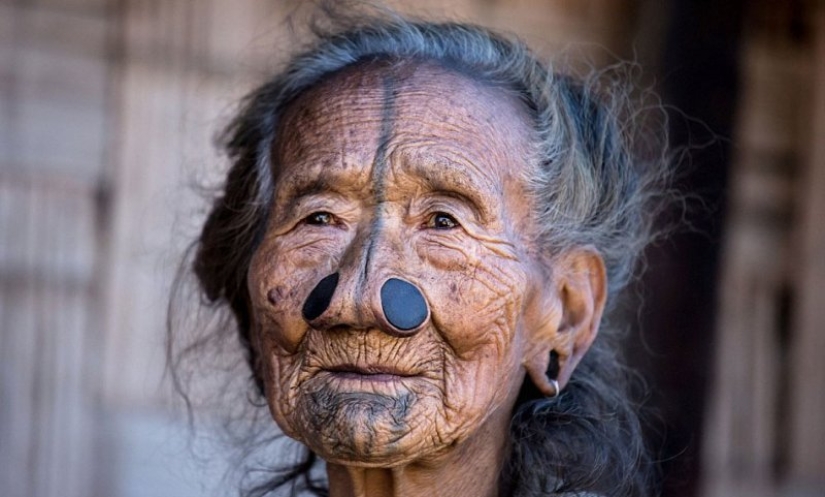6 of the most cruel tests that women from different countries of the world go to for the sake of beauty
Categories: Fashion | History | Nations
By Pictolic https://pictolic.com/article/6-of-the-most-cruel-tests-that-women-from-different-countries-of-the-world-go-to-for-the-sake-of-beauty1.htmlThe expression "victims of fashion" is firmly in use, although few people know the history of its appearance. Women have long subjected their bodies to real torture in order to conform to the canons of beauty. Deformed organs, earned chronic diseases and, unfortunately, often paid with their lives for their desire to be irresistible. In this review — the most shocking and cruel traditions of different peoples and eras.

"Victims of fashion" in the second half of the XVIII century began to call girls who were excessively fond of the so-called "Empire fashion", wore exceptionally light chiffon dresses, trying to imitate the images of ancient beauties.

In flowing translucent capes soaked with water for spectacular drapery, socialites boldly went outside on fierce frosty days and immediately fell ill with pneumonia or consumption. Two centuries ago, these diseases were practically incurable. A warning was addressed to the ladies by the French Journal de mode in 1802, recommending readers to visit the Montmartre cemetery and see how many young girls fell victim to "naked fashion".

However, compared to the ancient customs of some peoples of the world, the "difficulties" of European fashion are mere trifles. Much more serious difficulties were encountered in those countries where the aesthetics of the deformed female body was revered. So, in ancient China, tiny legs, which were called "lotus", were considered irresistible.

Despite the refined name, they looked more like hooves: from the age of four, the girl's limbs were constantly bandaged, 4 fingers "grew" to the foot, the length of which was 7-10 cm. The legs often bled, rotted, exuded a fetid smell, bones broke, nails grew into the skin. Girls in the richest families were tortured, it was a sign of aristocracy and the key to a successful marriage. By the way, the husband has never seen his wife's "lotus" feet, even in bed she remained in elegant shoes.

Female beauty through the eyes of the Kayan tribe residents was in the swan neck — the main maiden's pride, which, of course, was not given to the locals by nature. From the age of five, the parents put on the first six brass rings for the child and in the following years of life, until marriage, they added new ones.

The weight sometimes reached 9 kg, it was believed that with such a long neck the girl was guaranteed a successful marriage. By the way, as a punishment for infidelity, the husband could remove the rings, thereby condemning the woman to certain death from suffocation.

No less cruel is the tradition of tattooing the lips of representatives of the Ainu people, who made special incisions with a knife in the form of a smile, filling the wounds with ashes. In this way they hoped to find family well-being and peace in the afterlife.

Culturologists believe that the tradition of drawing a "smile" is one of the oldest in the world, it was followed by representatives of the Ainu people for a long time. Despite all the prohibitions on the part of the Japanese government, even in the twentieth century Ainu was tattooed, it is believed that the last "correctly" tattooed woman died in 1998.

But tattooed women from the Apatani tribe did not care about beauty at all, deliberately disfiguring themselves. They inserted wide tunnels into their ears and nose, and put ugly tattoos on their faces so that... they would not be taken as wives by representatives of other tribes.

Apatani is a very small ethnic group, numbering 26 thousand people. Mostly, the Apatani people live in northeastern India, in the southeastern Himalayas. In the early 1970s, the government banned the use of nose plugs and tattoos, and since they can now create problems for women who travel to the city in search of work, therefore, in modern times this tradition has almost disappeared.

The representatives of the Yao people have much more humane traditions. Long-haired girls from the Chinese village of Huanglo are famous for the fact that their braids can reach two meters, because they cut their hair only once in their lives at the age of 16, undergoing a kind of initiation ceremony.

From time immemorial, only her husband (and even then only on the wedding day) and children were allowed to see a chic hairstyle of a woman. In summer and autumn, while washing my hair in the river, the women carefully hid their braids under a blue towel. There was even a rule that a man (whether a local resident or a foreigner) who saw a woman's hairstyle was obliged to live in her family for three years as her husband. In 1987, fortunately, the law was repealed, and Chinese women had the opportunity to show everyone their burning black hair.
Recent articles

It's high time to admit that this whole hipster idea has gone too far. The concept has become so popular that even restaurants have ...

There is a perception that people only use 10% of their brain potential. But the heroes of our review, apparently, found a way to ...

New Year's is a time to surprise and delight loved ones not only with gifts but also with a unique presentation of the holiday ...